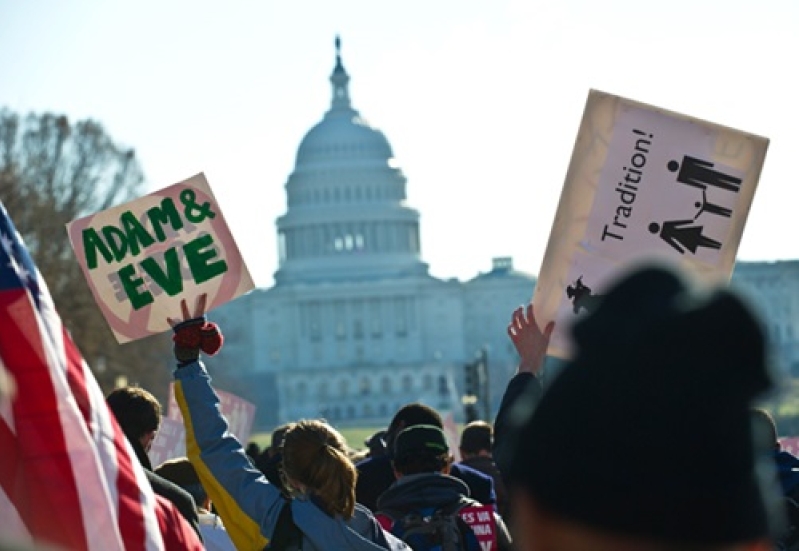
Supreme Court justices has announced that it will release ruling decisions on Monday over the challenges to California’s Proposition 8, which barred same-sex marriage in the state, and the federal Defense of Marriage Act, which denies federal benefit to legally married same-sex couples.
Similar to the review of Proposition 8 a day before, Wednesday’s oral argument over DOMA is characterized by its unusual length and the sharp divide among the judges over the portion of the federal law that prohibits same-sex couples married in the nine states that recognize gay marriage from receiving federal benefits, according to Star-Telegram. Other portions of the law, including one that allows states not to recognize gay marriage performed in other states, aren’t being challenged.
In theory, the justice could beyond their deadline, but they have not done so for years, according to Los Angeles Times. It’s also possible that the justices could ask to have a case re-argued next term, but that seldom happens.
Among the judges, Justice Anthony Kennedy once again held the middle, although, the Star-Telegram reports, his questions and asides during the 115-minute-long argument hinted that he might join the court’s liberal wing in striking down the portion being challenged.
Kennedy cited concerns about federalism, saying there was a "real risk" of the federal law running into conflict with a state's power.
"The question," Kennedy said, "is whether or not the federal government, under our federalism scheme, has the authority to regulate marriage."
Paul Clement defended DOMA on behalf of the Bipartisan Legal Defense Group (BLAG), which is led by House Republicans. He said that one reason DOMA was passed was for "uniformity," so that the federal definition of marriage would be the same throughout the states.
Justice Elena Kagan, the latest justice appointed by President Barack Obama, asked Clement, “When Congress targets a group that is not everybody’s favorite group in the world … do we think that Congress’ judgment was infected by dislike, by fear, by animus and so forth?”
Kagan said there was “a pretty good red flag that that’s what was going on.”
Chief Justice John Roberts challenged that position.
"Eighty-four senators based their vote on moral disapproval?" he asked.
Roberts also suggested that gays and lesbians should not be considered a politically powerless "suspect class," requiring higher scrutiny for discrimination in laws. Roberts noted the recent sea change in public opinion on the issue of gay marriage.
"As far as I can tell, political figures are falling over themselves to endorse," Roberts said.
From the other side, Chief Justice John Roberts Jr. and Justice Antonin Scalia gave the benefit of the doubt to the law, which defined marriage so that more than 1,100 federal benefits flow only to traditional, opposite-sex couples.
According to Star-Telegram, Roberts said that it isn’t for certain that Congress “had in mind same-sex couples” when it wrote “every one of those provisions.”
The two fundamental questions posed by United States v. Windsor case were whether House Republicans have the legal authority to defend DOMA now that the Obama administration has abandoned it, and whether the law violates the equal protection guarantees of the Constitution.
As with the California case, the justices questioned the approach of House Republican leaders funding the appellate defense of DOMA after Obama administration no longer defends the law in court. In addition, neither the Senate nor House Democrats agreed to join the House Republicans in defending the law.
“From where do they derive the right, the statutory right, to take on that responsibility of representing the House in items outside of the House?” Justice Sonia Sotomayor asked, the Star-Telegram reported.
Conservative justices expressed disapproving remarks of Obama not defending the law, even though officials say they’ll enforce it until it is struck down. Justice Roberts suggested that Obama “doesn’t have the courage of his convictions.”
Despite the fallacies in the opposition and supporting camps, the majority of justices are accepting the so they might rule on the merits.






